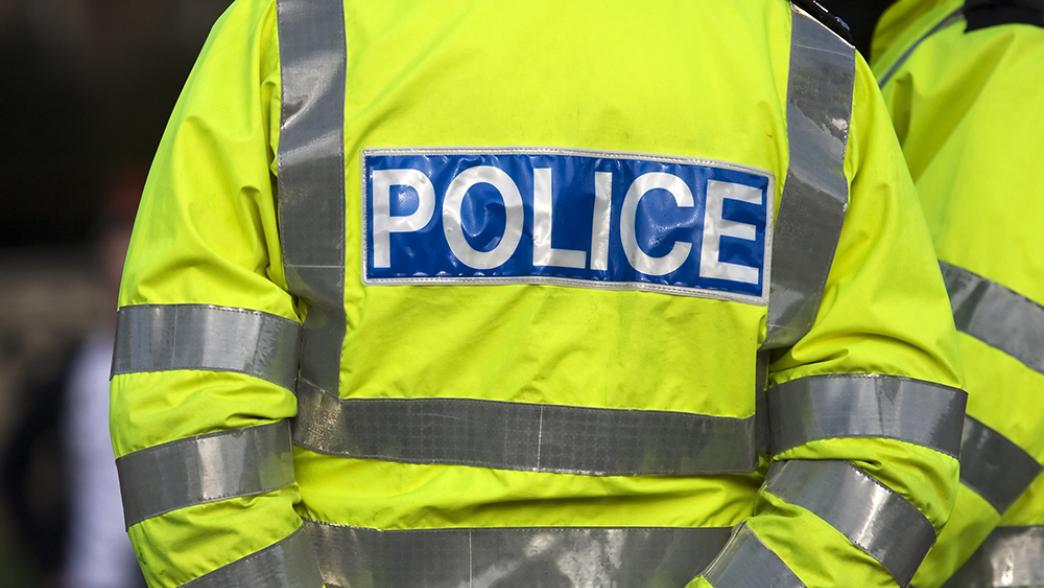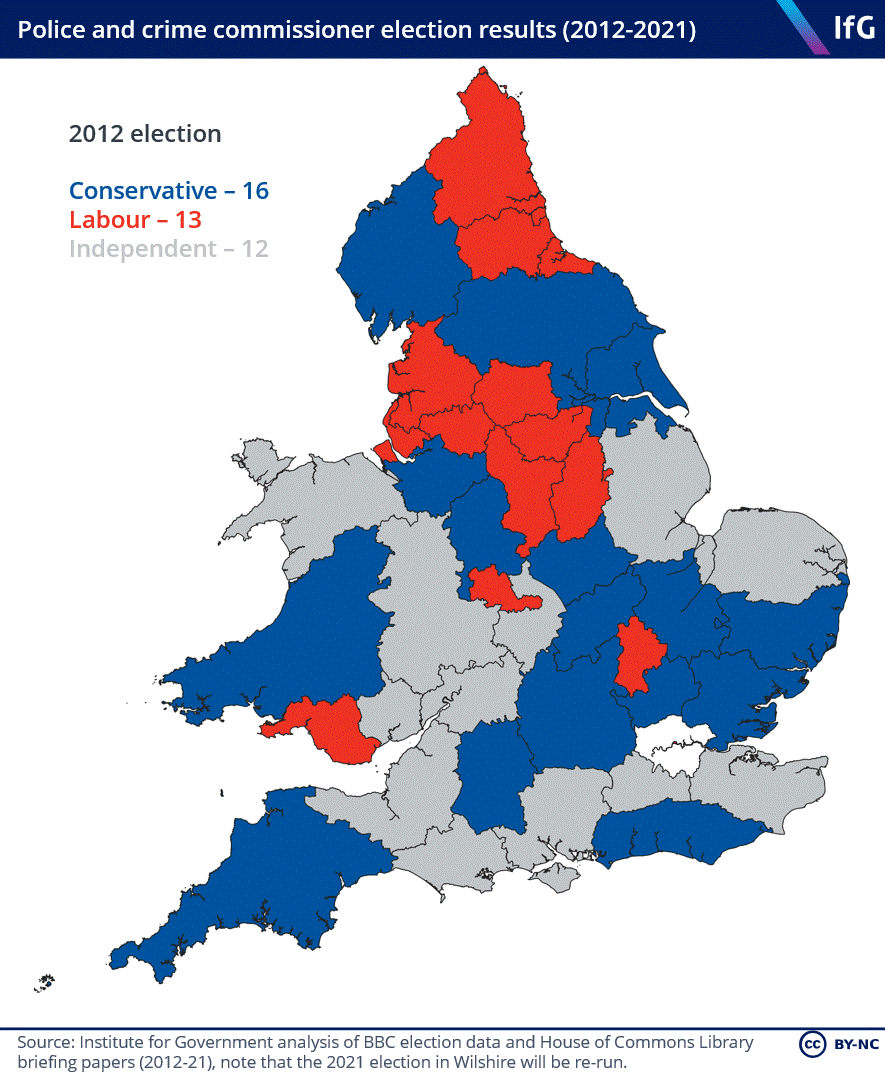Local elections 2024: Police and crime commissioners
On 2 May 2024, elections are taking place for 37 police and crime commissioners (PCCs).

This Thursday, elections are taking place for 37 police and crime commissioners (PCCs), who set policing priorities and hold to account police forces across most of England and Wales.
Why were police and crime commissioners created?
The role of police and crime commissioner was created by the Police Reform and Social Responsibility Act 2011 to replace police authorities in England and Wales (except in London). This reform did not cover Scotland and Northern Ireland where policing is devolved.
This reform had been part of the Conservative Party’s manifesto since 2005. 24 Strickland P, Police and Crime Commissioners, November 2013, commonslibrary.parliament.uk/research-briefings/sn06104/ The stated aim was to strengthen local accountability and make police forces more responsive to local needs, responding to the fact that police authorities had been “invisible to the public". 25 Home Office, Policing in the 21st century, reconnecting police and the people - consultation, July 2010, www.gov.uk/government/publications/policing-in-the-21st-century-reconnecting-police-and-the-people-consultation
What are the functions of police and crime commissioners?
The three core functions of PCCs are to appoint the chief constable (and remove them, if necessary); to set the budget; and to set local policing priorities. PCCs have to swear an oath of impartiality when they are elected, and a Policing Protocol sets out that chief constables must remain operationally independent.
Under the terms of the 2011 Act, PCCs must:
- secure an efficient and effective police for their area
- appoint the Chief Constable, hold them to account, and if necessary dismiss them
- set the police and crime objectives for their area through a police and crime plan
- set the force budget and determine the precept [the amount people pay through council tax for policing]
- contribute to the national and international policing capabilities set out by the Home Secretary
- bring together community safety and criminal justice partners to make sure local priorities are joined up. 26 Association of Police and Crime Commissioners, Key functions, www.apccs.police.uk/role-of-the-pcc/key-functions/
Since PCCs were introduced, their remit has expanded to include responsibility for commissioning the majority of victims’ services and the ability to take on governance of the local fire and rescue service. This has been implemented in Staffordshire, Essex, Northamptonshire, Cumbria and North Yorkshire where there are ‘police, fire and crime commissioners’.
These commissioners have responsibility for setting fire and rescue objectives through their area, appointing the chief fire officer (and again removing them, if necessary), and setting the service budget.
Which mayors have the functions of police and crime commissioners?
The mayor of London has held equivalent powers over policing in London since the role was established in 2000 – before the creation of police and crime commissioners. Since then, the functions of PCCs were transferred to the mayors of Greater Manchester (in 2017) and West Yorkshire (in 2021) when their roles were created.
In the May 2024 elections, the powers of the police and crime commissioner are being merged with the existing role of the mayor of South Yorkshire and the new post of mayor of North Yorkshire. Plans were also in place to merge the powers in the West Midlands, however this is no longer going ahead after it was found that Home Office had provided insufficient information when consulting on the plans. 27 West Midlands Police and Crime Commissioner, ‘PCC Statement: Judicial Review: Home Secretary’s decision to abolish PCC role was unlawful’, 18 March 2024, retrieved 5 April 2024, www.westmidlands-pcc.gov.uk/pcc-statement-judicial-review-home-secretarys-decision-to-abolish-pcc-role-was-unlawful In the 2022 Levelling Up white paper, the government set out a preference for merging the PCC role with directly-elected mayors but only in areas where the boundaries of the police area aligns with the mayoral area.
How are police and crime commissioners held accountable?
The commissioners are scrutinised by police and crime panels (PCPs), which are made up of a minimum of 10 representatives from the local authorities in the force area. The panels confirm or veto the appointment of the chief constable as well as the level of the council tax precept. For both of these functions, at least two thirds of the panel have to agree.
In addition to attending meetings when required, the PCC has to provide the panel with an annual report as well as any information which the panel “reasonably requires”. The panel can also require the attendance of the PCC at a meeting.
How are police and crime commissioners elected?
Police and crime commissioners are elected every four years. Until the Elections Act passed in April 2022, PCCs were elected using the supplementary vote system, under which voters could express a first and second preference candidate. However, following the passing of the Elections Act 2022, the May 2024 PCC (and mayoral) elections will be held under the first-past-the-post system used for UK parliamentary elections.
What happened in past police and crime commissioner elections?
The first elections were held in 41 police force areas in November 2012. Sixteen Conservative, 13 Labour and 12 independent PCCs were elected. All 12 of the independent candidates that were elected had prior experience working in the criminal justice system, as magistrates, police officers or former members or chairs of the police authorities. 28 Gardland J and Terry C, How not to run an election The Police & Crime Commissioner Elections, Electoral Reform Society, 15 November 2012, www.electoral-reform.org.uk/wp-content/uploads/2017/06/2012-England-and-Wales-Police-Crime-Commissioner-Elections.pdf
In 2016, party political candidates were more successful. In total, 20 Conservative, 15 Labour, three independent and two Plaid Cymru PCCs were elected.
The most recent elections in May 2021 saw no independent candidates elected. The Conservatives made 10 gains to win a total of 29 PCCs, while eight Labour and one Plaid Cymru candidate were also elected. The election for Wiltshire PCC was re-run in August 2021, after the candidate who won the most votes at the May election withdrew due to a historical motoring offence. The Conservative candidate, Philip Wilkinson, was elected following a re-run in August 2021.
On 14 October 2021, the police, fire and crime commissioner for North Yorkshire, Philip Allott, resigned after a no-confidence vote on the police, fire and crime panel. Zoë Metcalfe, the Conservative candidate, was elected to replace him in a by-election held on 26 November 2021.
Turnout in PCC elections has risen over time. The 2012 election averaged just 15% (measured as total valid votes as a proportion of the electorate, across all elections). This increased to an average of 27% in 2016, with particularly high increases in Wales where the elections were combined with elections for the Welsh parliament. 29 Defty A, Improvements in turnout and more partisan voting: PCC Elections 2016, LSE blogs, 16 May 2016, blogs.lse.ac.uk/politicsandpolicy/improvements-in-turnout-and-more-partisan-voting-pcc-elections-2016/ Turnout increased further in 2021 to an average of 33%. 30 House of Commons Library, UK Election Statistics: 1918-2023, A Long Century of Elections, August 2023, researchbriefings.files.parliament.uk/documents/CBP-7529/CBP-7529.pdf

How are police and crime commissioners funded?
Police and crime commissioners receive money for policing from the Home Office’s police grant, the aggregate of which is set at £9.7bn for 2024/25. 32 Home Office, Police Grant Report (England and Wales) 2024-25, January 2024, www.gov.uk/government/publications/provisional-police-grants-in-england-and-wales-2024-to-2025 This includes a specific ‘top-up grant’ for the PCCs in Wales that ensures they receive the same change in the main police grant as PCCs in England, alongside grants from the Welsh government. In addition to the central grant, the Home Office can reallocate funding for national policing priorities throughout the year.
Funding for salaries and offices also comes from the police ‘precept’ component of local council tax – the amount people pay through council tax for policing. The level of the precept is now set by the PCCs, subject to approval by the police and crime panels.
- Topic
- Devolution Public services
- Keywords
- Criminal justice Local elections
- Publisher
- Institute for Government